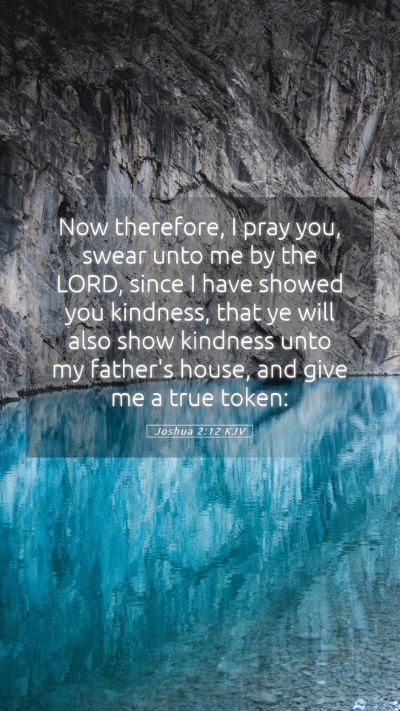Old Testament
Genesis Exodus Leviticus Numbers Deuteronomy Joshua Judges Ruth 1 Samuel 2 Samuel 1 Kings 2 Kings 1 Chronicles 2 Chronicles Ezra Nehemiah Esther Job Psalms Proverbs Ecclesiastes Song of Solomon Isaiah Jeremiah Lamentations Ezekiel Daniel Hosea Joel Amos Obadiah Jonah Micah Nahum Habakkuk Zephaniah Haggai Zechariah MalachiJoshua 2:12 Meaning
What is the meaning of Joshua 2:12?
Now therefore, I pray you, swear unto me by the LORD, since I have showed you kindness, that ye will also show kindness unto my father's house, and give me a true token:
Joshua 2:12 Bible Verse Meaning
Understanding Joshua 2:12
Verse: "Now therefore, I pray you, swear unto me by the LORD, since I have showed you kindness, that ye will also show kindness unto my father's house, and give me a true token." (Joshua 2:12, KJV)
Overview of Meaning
This verse captures a critical moment in the narrative of Joshua and the Israelites as they prepare to enter the Promised Land. Here, Rahab, a Canaanite harlot, pleads for her family's safety after helping the Israelite spies. Her plea highlights themes of faith, kindness, and covenant loyalty.
Bible Verse Interpretations
- Matthew Henry's Commentary: Henry emphasizes Rahab's faith and the significance of her request for kindness, noting that she recognized the grace she had extended and sought a reciprocal action. This interaction reflects the covenantal nature of biblical relationships.
- Albert Barnes' Notes: Barnes points out the practical aspect of Rahab's appeal. She had risked her life for the spies, and now she seeks assurance of protection for her family. This exchange illustrates the importance of mutual obligation and loyalty in the biblical narrative.
- Adam Clarke's Commentary: Clarke provides insight into the nature of Rahab's plea, identifying it as not just a request for safety but also an appeal that embodies a deeper trust in God’s mercy. He notes her role in redemptive history, which is often overlooked due to her background.
Scripture Analysis
This plea for kindness serves as a pivotal point that foreshadows Rahab's inclusion in the lineage of Christ (Matthew 1:5). By seeking a "true token", she demonstrates awareness of the seriousness of covenant obligations, anticipating Israel's unique relationship with God.
Furthermore, the request for a true token can be seen as a symbol of faith; it signifies her reliance on God's promises amidst her precarious situation. Rahab's act is a reflection of the broader theme of redemption found throughout Scripture, emphasizing that God's grace extends beyond the borders of Israel.
Application of this Verse
The verse challenges readers to consider their actions and relationships. In what ways can we extend kindness to others, especially those who are marginalized or in need? Rahab's story encourages us to act in faith, trusting in God's protection and plans for our lives.
Additionally, this account serves as a call to recognize the importance of mutual kindness in human relationships, reflecting the character of God in our dealings. It reinforces the notion that our acts of kindness can lead to unexpected alliances and blessings.
Cross References
- Hebrews 11:31: By faith, Rahab did not perish with those who were disobedient because she had given a friendly welcome to the spies.
- Matthew 1:5: And Salmon begat Boaz of Rahab...
- James 2:25: Likewise was not Rahab the harlot justified by works, when she had received the messengers, and had sent them out another way?
Conclusion
Joshua 2:12 serves as a remarkable display of faith and the power of kindness as Rahab seeks to secure safety for her family. This verse, rich in its implications, invites deeper reflection on the themes of protection, loyalty, and God's redemptive purposes throughout the Scripture. For anyone engaging in Bible study insights or Bible verse commentary, understanding such passages enables a profound appreciation of the interconnectedness of God's plan for humanity.


